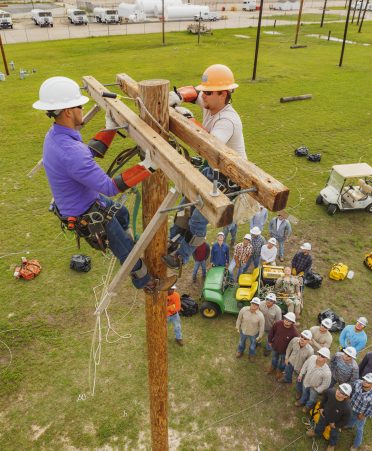(ROSENBERG, Texas) – Rosenberg is seeing a high demand for housing as growth moves south and west in the city. As housing is built, the city attracts businesses of all sizes.
Jeremy Heath, director of economic development for the city of Rosenberg, said the city’s western side is seeing industrial growth, while commercial and retail businesses are sprouting up on the Interstate 69 and Texas Highway 36 corridors.
“People are moving out this way for a lot of reasons,” Heath said.
All of the growth means job opportunities for graduates of Texas State Technical College in Fort Bend County’s Electrical Lineworker Technology program and other technical programs.
“When you are in a high-growth cycle and you have companies wanting to purchase properties and put facilities there, one of the most important things is speed to market,” Heath said. “From the time they make the decision and purchase the property, they want to get the facility built and operational as soon as possible.”
Heath said there is demand for enough electrical workers to ensure that companies like CenterPoint Energy are providing the needed infrastructure for growth in Rosenberg and throughout the Houston area.
“They (business prospects) will go to another market that will be ready for them if we cannot accommodate,” Heath said.
CenterPoint Energy has looked to TSTC’s Electrical Lineworker Technology program to hire several of its workers. The company has also donated equipment in the past to the program for training purposes.
“CenterPoint Energy is committed to developing the workforce of the future, and our partnership with TSTC is a prime example of that,” according to a company statement. “Investing in workforce development contributes to the vitality of the communities in which we live and work.”
Troy Eads, lead instructor in TSTC’s Electrical Lineworker Technology program in Fort Bend County, said as growth occurs in Rosenberg and surrounding areas, workers are needed to install bigger wires, build more substations and perform other electrical work.
“You put yourself on the line every single day for someone you may not even know,” he said.
Eads said people interested in pursuing the electrical lineworker field need to be good at taking direction, have a good attitude and earn the respect of others. He said lineworkers who do not want to climb poles or be in bucket trucks can instead become engineering technicians, foremen or supervisors.
TSTC offers an Associate of Applied Science degree in Electrical Lineworker Technology and an Electrical Lineworker certificate of completion. Graduates have the opportunity to sign up for a three-week commercial driver’s license course already covered by their tuition. These lessons are taught by Ancora Corporate Training, which also teaches program graduates at the Harlingen, Marshall and Waco campuses.
The Electrical Lineworker Technology program is part of TSTC’s Money-Back Guarantee initiative. Students working toward an associate degree who sign up for the program during their first semester are eligible to receive a tuition refund for their time at TSTC if they do not secure a job in their field within six months of graduation.
According to the U.S. Department of Labor’s CareerOneStop website, electrical power line installers and repairers in Texas make a yearly median salary of more than $55,000. Texas will need more than 13,800 workers by 2028.
Registration continues for the fall semester, and scholarships are available. For more information, go to tstc.edu.
